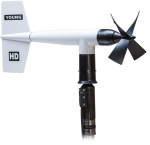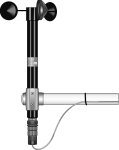
Compatible with most Campbell Scientific data loggers






Overview
The 03101 is the three-cup anemometer included with our Wind Sentry Sets. You can purchase it separately if your application requires only wind speed measurements. The 03101 connects directly to a Campbell Scientific data logger, which measures the anemometer's pulse signal and converts the signal to engineering units (mph, m/s, knots).
Read MoreBenefits and Features
- Ideal for applications that do not require wind direction measurements
- Compatible with most Campbell Scientific data loggers
- Designed for continuous, long-term, unattended operation in adverse conditions
- Small size, simplicity, and rugged construction provide a quality instrument for a modest price
- Ideal for wind profile studies
- Compatible with the LLAC4 4-channel Low-Level AC-Conversion Module, which increases the number of anemometers one data logger can measure
- Campbell Scientific version uses shielded bearings, which lowers the anemometer's starting threshold
Images



Similar Products
Detailed Description
The 03101 uses a cup wheel assembly to measure wind speed. Rotation of the cup wheel produces an ac sine wave that is directly proportional to wind speed. The frequency of the ac signal is measured by a data logger pulse count channel, then converted to engineering units (mph, m/s, knots). Campbell Scientific’s version uses shielded bearings, which lowers the anemometer’s threshold.
Compatibility
Mounting
The 03101 anemometer is supplied with a galvanized 10-in.-long x ¾-in. IPS threaded pipe, which mounts to a crossarm via a CM220 mount or 1049 Nu-Rail fitting. The 03101 can also be mounted to the top of a CM106B or a stainless-steel tripod via the CM216.
Wind Profile Studies
An ideal application for the Wind Sentry is wind profile studies. For this application, the LLAC4 4-channel Low Level AC Conversion Module can be used to increase the number of anemometers measured by one data logger. The LLAC4 allows data logger control ports to read the anemometer’s ac signals instead of using pulse channels. Data loggers compatible with the LLAC4 are the CR200(X)-series (ac signal ≤1 kHz only), CR800, CR850, CR1000, CR3000, and CR5000.
Data Logger Considerations
The 03101 uses one pulse count channel on the data logger.
Programming
The 03101 is read by the PulseCount Instruction in CRBasic and by Instruction 3 (Pulse Count) in Edlog. Wind speed measurements can be taken and processed with any of the data loggers.
Specifications
| Sensor | 3-cup anemometer |
| Measurement Description | Wind speed |
| Range | 0 to 50 m/s (112 mph) |
| Gust Survival | 60 m/s (134 mph) |
| Sensor | 12-cm diameter cup wheel assembly, 40-mm diameter hemispherical cups |
| Accuracy | ±0.5 m/s (1.1 mph) |
| Turning Factor | 75 cm (2.5 ft ) |
| Distance Constant | 2.3 m (7.5 ft) 63% recovery |
| Starting Threshold | 0.5 m/s (1.1 mph) |
| Transducer | Stationary coil (1300 ohm nominal resistance) |
| Output Frequency | 1 cycle per cup wheel revolution (0.75 m/s per Hz) |
| Transducer Output | AC sine-wave signal induced by rotating magnet on cup wheel shaft 100 mV peak-to-peak at 60 rpm (6 V peak-to-peak at 3600 rpm) |
| Operating Temperature Range | -50° to +50°C (assumes non-riming conditions) |
| Cup Wheel Diameter | 12 cm (4.7 in.) |
| Height | 23.4 cm (9.2 in.) |
| Weight | 113 g (4 oz) |
Frequently Asked Questions
Number of FAQs related to 03101-L: 11
Expand AllCollapse All
-
Very low voltage outputs from the sensor could be the result of a bad coil or an internal magnet that was mounted incorrectly. Refer to the “Troubleshooting” section of the instruction manual for more information. If it is necessary to return the sensor to Campbell Scientific for repair, request a return material authorization (RMA) number by following the steps listed on our Repair and Calibration page.
-
Follow these steps:
- Remove the screw that attaches the 03101-L to the pipe mount fitting.
- Set the screw aside, but do not discard it.
- Mount the plastic flange of the 03101-L sensor to the underside of the crossarm.
- Use the screw to secure the sensor to the crossarm.
-
For information, refer to the “Calibration” section at the end of the instruction manual.
-
The cup assembly can be replaced with pn 4609, Replacement Wind Speed Cup Assembly for 03001 or 03101.
-
The pulse output can’t be converted easily to a 4 to 20 mA output without additional equipment. For a wind monitor designed to generate a 4 to 20 mA output, refer to the R. M. Young website.
-
No. But using a LLAC4 will convert the ac signal for up to four 03101-L sensors (and other ac output anemometers) to individual 0 to 5 Vdc TTL level square wave outputs. For more information, see the LLAC4 specification information.
-
03101-L Specifications
Gust survival: 134 mph (60 m/s)
Accuracy: ±1.1 mph (0.5 m/s)
Threshold (w/ shielded bearings): 1.1 mph (0.5 m/s)
Distance constant: 7.5 ft (63% recovery)014A-L Specifications
Operating range: 0 to 100 mph (0 to 45 m/s)
Accuracy: ±0.25 mph (0.11 m/s) or ±1.5%
Threshold: 1 mph (0.45 m/s)
Distance constant (aluminum cups): 15 ft (4.6 m)
Distance constant (optional fast response Lexan cups): < 5 ft (1.5 m)Any mechanical wind speed sensor will need to have its bearings replaced on a regular basis. The 03101-L is a less expensive sensor and does not have a reed switch to replace. It’s easier to work on, and the bearings are less expensive. The turret covering the bearings is longer and protects the bearings better from dust and debris. The cups and sensor body are plastic and more fragile, so careful handling is required, but they hold up well after the sensor is installed.
The 03101-L comes with a ¾ in. pipe. The 014A-L has a 1 in. pipe.
-
Most Campbell Scientific sensors are available as an –L, which indicates a user-specified cable length. If a sensor is listed as an –LX model (where “X” is some other character), that sensor’s cable has a user-specified length, but it terminates with a specific connector for a unique system:
- An –LC model has a user-specified cable length for connection to an ET107, CS110, or retired Metdata1.
- An –LQ model has a user-specified cable length for connection to a RAWS-P weather station.
If a sensor does not have an –L or other –LX designation after the main model number, the sensor has a set cable length. The cable length is listed at the end of the Description field in the product’s Ordering information. For example, the 034B-ET model has a description of “Met One Wind Set for ET Station, 67 inch Cable.” Products with a set cable length terminate, as a default, with pigtails.
If a cable terminates with a special connector for a unique system, the end of the model number designates which system. For example, the 034B-ET model designates the sensor as a 034B for an ET107 system.
- –ET models terminate with the connector for an ET107 weather station.
- –ETM models terminate with the connector for an ET107 weather station, but they also include a special system mounting, which is often convenient when purchasing a replacement part.
- –QD models terminate with the connector for a RAWS-F Quick Deployment Station.
- –PW models terminate with the connector for a PWENC or pre-wired system.
-
Not every sensor has different cable termination options. The options available for a particular sensor can be checked by looking in two places in the Ordering information area of the sensor product page:
- Model number
- Cable Termination Options list
If a sensor is offered in an –ET, –ETM, –LC, –LQ, or –QD version, that option’s availability is reflected in the sensor model number. For example, the 034B is offered as the 034B-ET, 034B-ETM, 034B-LC, 034B-LQ, and 034B-QD.
All of the other cable termination options, if available, are listed on the Ordering information area of the sensor product page under “Cable Termination Options.” For example, the 034B-L Wind Set is offered with the –CWS, –PT, and –PW options, as shown in the Ordering information area of the 034B-L product page.
Note: As newer products are added to our inventory, typically, we will list multiple cable termination options under a single sensor model rather than creating multiple model numbers. For example, the HC2S3-L has a –C cable termination option for connecting it to a CS110 instead of offering an HC2S3-LC model.
-
No. Installing the anemometer in a tilted position will cause damage to the bearings and the shaft, and the bearings will be infiltrated with water and dust.
Privacy Policy Update
We've updated our privacy policy. Learn More
Cookie Consent
Update your cookie preferences. Update Cookie Preferences







